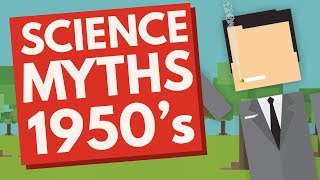(单词翻译:单击)
Hey there! Welcome to Life Noggin.
大家好!欢迎来到脑洞大开的生命奇想。
With every new scientific discovery comes a chance to laugh at what people used to believe.
每次有新的科学发现,人们都有机会嘲笑过去相信的东西。
From "smoking is healthy" to "the earth is flat," there's a lot of crazy stuff out there. (Seriously guys, the earth is not flat.)
从“吸烟有益于健康”到“地球是平的”,那时候很多东西都很疯狂。(说真的,地球不是平的。)
While theories like geocentrism mostly died out centuries ago, as recently as the mid-20th century people believed in things like lobotomies and drinking during pregnancy.
虽然像地心说这样的理论在几个世纪前就已经消亡了,但20世纪中期,人们仍然相信诸如脑叶切除术和怀孕期间饮酒之类的事情。
So let's take a look at some of the scientific things we believed in the 1950s.
来看看20世纪50年代我们所信奉的科学。
As I mentioned earlier, people didn't always think that smoking cigarettes was bad for you.
正如我之前提到的,人们并不总是认为吸烟有害健康。
Cigarette companies used to boast that their brand wouldn't hurt your throat and sinuses.
过去烟草公司常常鼓吹他们的产品不会伤害喉咙和鼻窦。
Some advertisements even claimed to have scientific proof that their cigarettes were less irritating than their competitors.
有些广告甚至声称有科学证据证明他们的香烟比竞争产品的刺激性更小。
As it turns out, the researchers who found this "proof" were actually sponsored by the cigarette company.
最终,人们发现这种“证据”的研究人员实际上收了烟草公司的钱。
And other scientists who weren't sponsored found evidence to dispute these claims. But people still believed that smoking wasn't harmful.
而其他没有收钱的科学家也会发现一些证据来反驳这些说法。但是人们仍然相信吸烟是无害的。
Studies in the coming decades obviously proved that wrong. Along those lines, the '50s were the peak lobotomy era.
后来几十年的研究证明了这一点是错的。同时,50年代是脑叶切除的高峰时期。
Lobotomies were a type of surgery that involved drilling two holes into the skull and pushing spikes called leucotomes into the brain.
脑叶切除术是一种外科手术,它需要在颅骨上钻两个孔,并将白细胞介素钉刺入大脑。
The surgeon would then move the leucotomes back and forth in the frontal lobe of the brain.
然后,外科医生会在大脑的前额叶中来回移动脑白质切断器。
Lobotomies were supposed to help with all kinds of mental health issues, from depression to schizophrenia.
人们认为前脑叶白质切除术可以帮助解决各种心理健康问题,包括抑郁症和精神分裂症。
Portuguese neurologist António Egaz Moniz invented the lobotomy in 1935, and he actually received the Nobel Prize for his invention in 1949.
1935年,葡萄牙的神经学家安东尼奥·伊格兹·莫尼兹(António Egaz Moniz)发明了前脑叶白质切除术,于1949年获得了诺贝尔奖。
But by the '60s, they were falling out of favor, since they left a lot of patients apathetic, lethargic, and even with major personality changes.
但是到了60年代,前脑叶白质切除术开始失宠了,因为这种手术让很多病人变得麻木不仁,昏昏欲睡,甚至还有一些重大的性格变化。
Another interesting mental health trend in the 1950s was LSD therapy.
20世纪50年代心理健康方面,另一个有趣的趋势是LSD疗法。
Dr. Albert Hofmann discovered the effects of the drug in 1943, and its medicinal use continued through the next couple decades.
阿尔伯特·霍夫曼博士在1943年发现了这种药物的作用,并在接下来的几十年里继续使用。
LSD was used by doctors and researchers with purposes ranging from treating alcoholism to calming patients in psychiatric wards.
LSD被医生和研究人员用来治疗酒精中毒,安抚精神病患者。
This happened until it was made illegal in many countries in the '60s.
这种情况一直持续,直到60年代,该药物在许多国家被定为非法。
Despite all this, the 1950s also saw a lot of scientific advancements and new discoveries.
尽管如此,20世纪50年代出现了许多科学进步和新发现。
The polio vaccine was created in response to huge outbreaks in the early '50s.
脊髓灰质炎疫苗是为了应对50年代早期的大规模疫情而研制的。
Psychologists began to focus more on behaviorism as well as cognitive psychology.
心理学家开始更多地关注行为主义和认知心理学。
The idea of climate change was becoming more of a concern, too, as scientists researched rising CO2 rates.
科学家们研究不断上升的二氧化碳浓度,气候变化的概念也吸引了越来越多的注意。
But overall, it's pretty clear that a lot of scientific facts and theories weren't understood nearly as well in the '50s.
但总的来说,很明显,许多科学事实和理论在50年代几乎还是没有得到理解。
So I, for one, am glad to live in the present day! So I think it'd be a fun idea if I covered multiple decades.
因此,我很高兴活在当下!所以我认为如果我能活几十年,还是很有趣的。
What do you think? Which decades should I talk about next? Let me know in the comment section below.
你怎么看?接下来我们应该聊聊哪个年代呢?在下面的评论栏里告诉我。
If you enjoyed this video why don't you head on over and watch this video about what would happen if robots took our jobs. Check it out.
如果你喜欢这个视频,去看看这个视频吧,看看如果机器人抢走了我们的工作,会发生什么。点击查看。
To start, which job do you think a robot will take over first? A doctor or a nurse?
首先,你认为机器人会先取代哪个工种?医生还是护士?
Interestingly, current work in the field of artificial intelligence seems to suggest that a doctor might be the first in line.
有趣的是,目前在人工智能领域的研究似乎表明,医生可能首当其冲。
My name is Blocko. This has been Life Noggin. Don't forget to keep on thinking!
我是宝高。这里是脑洞大开的生命奇想!思考不要停!


